When the Covid-19 pandemic hit in 2020 in the United States, the executive team pulled the plug on the seventh season of NBC’s The Blacklist. There were three episodes yet to be filmed and only half of episode 19 in the can — most of which had been shot out of order.
So they turned to visual effects company Proof to complete the season, giving Proof about five weeks to finish the animation and having the actors record dialogue from home. Everything was pulled together and editing done remotely.
In Singapore, the actors in favourite TV series and movies carried on filming once the Circuit Breaker is over. They may appear glamorous and look unaffected by the pandemic, but nothing could be further from the truth.
Not all that glitters is gold
In any environment, filmmaking is extremely tedious and labour-intensive. It requires hundreds upon hundreds of hands: from actors, directors and extras to hair and makeup artists and prop hands. With the coronavirus hanging in the air, filmmaking becomes even more dreary.
To prevent productions from becoming superspreader events, the Infocomm Media Development Authority (IMDA) has laid out a set of very strict safety rules for content production to resume and those carrying out media production activities have to comply.
These include requiring all personnel, from performers to crew members to be fully vaccinated, and no more than 50 personnel are allowed to be on location at any one time, of which there can be no more than 20 unmasked onscreen performers. At any given moment, if there is to be “live” singing, there must be a safe distance of two metres between two people.
Although child actors, aged 12 and below, were exempted from the vaccination requirements at that point in time, production teams still needed to ensure that their interaction with the rest of the personnel were kept to a minimum.
In addition, only onscreen performers can unmask for the entire production, and they can only do so when it is their turn to be in front of the camera.
These regulations have exacted a heavy toll on many shoots, forcing them to grind to a halt, budgets to rise, episodes to be slashed and even some shows cancelled outright. Two local productions that carried on filming during this time were TV series This Land is Mine, a post-World War II period drama; and Reunion Dinner, the 2022 Lunar New Year-themed movie.
Reunion Dinner (Movie)
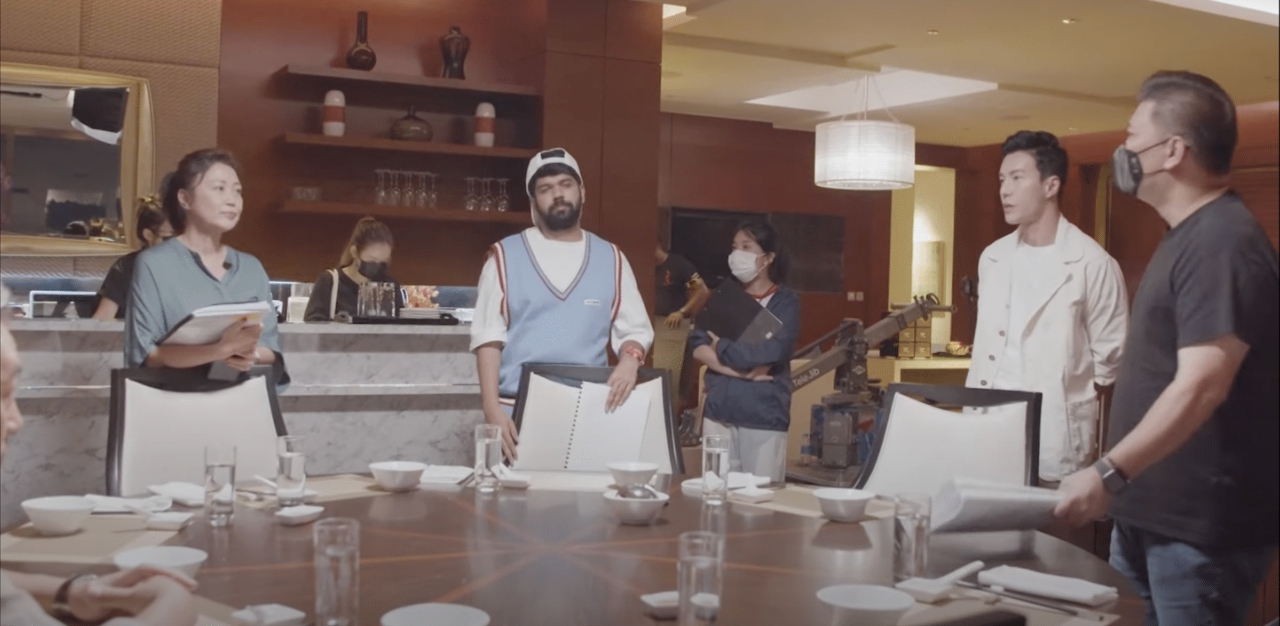
Reunion Dinner, the 2022 Lunar New Year-themed movie, was a production that was conceived, filmed and released entirely during the pandemic — making it the first local movie to do so. It hit the big screens in January 2022.
Starring Lawrence Wong, Mark Lee and Xiang Yun, Reunion Dinner is about an advertising executive who is estranged from his mother but has to stage a fake reunion dinner for his client and his girlfriend’s father. The entire production was carried out under strict Covid-19 hygiene guidelines, such as having to use split and remote teams.
Veteran actress Xiang Yun plays Yan Ling, a mamasan who works at a KTV lounge and the mother of lead actor Wong. The plot centres around a small group of actors as they make peace with their past in the days leading up to the reunion dinner.
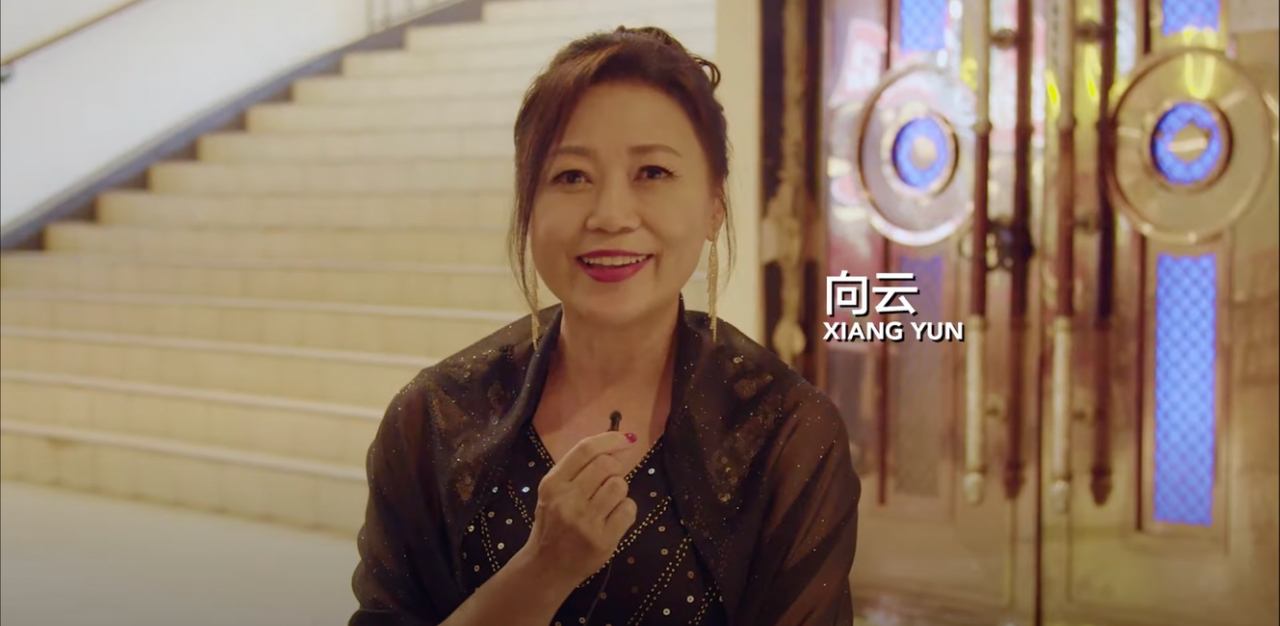
It was Xiang Yun’s first time playing a mamasan in a club. Speaking in Mandarin, she says, “It was not too difficult to keep the number of personnel on set below the 50-limit throughout the entire production.” This was thanks to the small number of cast in the film.
“Besides the usual safe-distancing measures, some additional adjustments had to be made. The actors and film crew had multiple separate resting areas and were not allowed to mingle with one another unnecessarily, even during mealtimes,” she adds.
Masks had to be worn at all times while on the set unless it was the actor’s turn to be in front of the camera. In fact, Xiang Yun says she was so used to having a mask on for such a long time that she felt like “something was missing from my costume set-up” whenever she unmasked for her scenes.
One fun fact that Xiang Yun shares is the shooting of one of her scenes in a KTV lounge was rather untimely as it took place around the time when KTV lounges were facing intense scrutiny for causing several COVID-19 clusters in July 2021, upending Singapore’s recovery timeline.
Still, Xiang Yun sees media production during the pandemic as a way to “feed the soul when social interactions are kept to a minimum”, and hopes that “a light-hearted Lunar New Year movie will go some way in bringing hope and cheer to everyone”.
The Land is Mine (TV series)
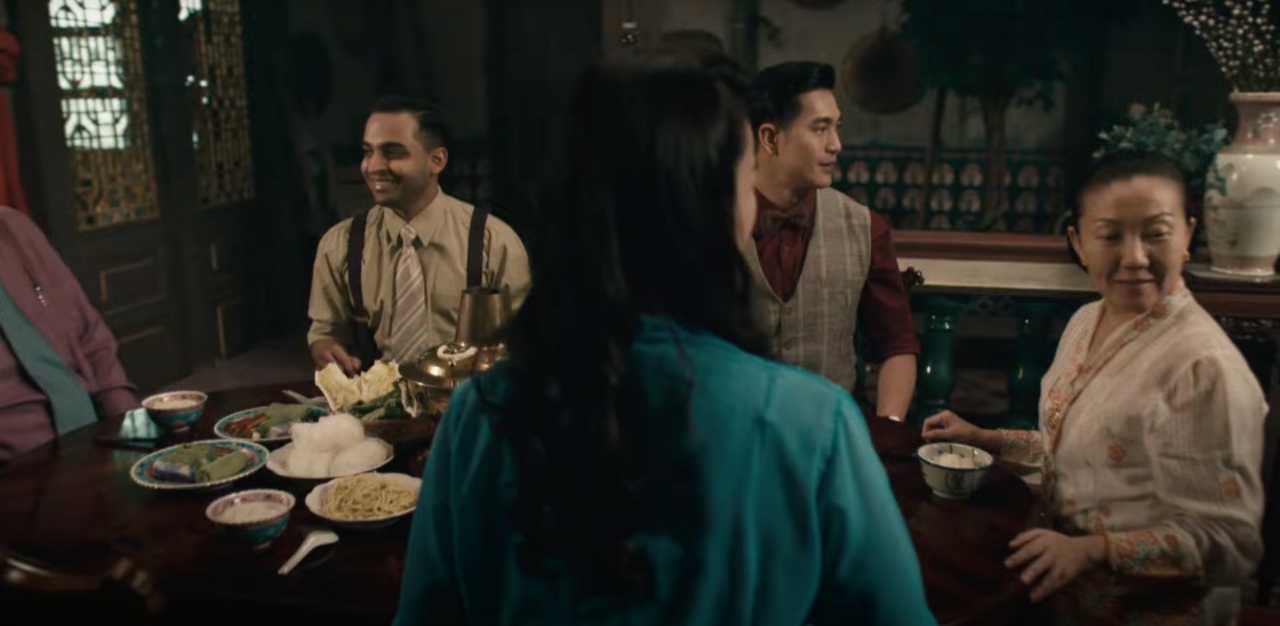
The shooting of period drama This Land Is Mine was right smack in the middle of the pandemic. It is based on the book The Devil’s Circle, the third in a series of historical novels by Singapore’s former Attorney General Walter Woon, and was set in 1940s post-war Singapore.
Starring Pierre Png, Rebecca Lim, Shabir and Noorlinah Mohamed, the series was supposed to be filmed in Malaysia. But the plans were thwarted when the pandemic hit and international travel became impossible. So the production crew built at least four period sets in Singapore.
One was a 1940s nightclub complete with coloured lightbulbs on the stage, and another was an entire kampung hut with wooden flooring, a porch, and a fake well at the back. They were housed within and outside a building at Kay Siang Road but no one could tell when they passed by.
In an interview with TheHomeGround Asia, Noorlinah says she does not feel comfortable labelling the pandemic measures as “difficulties”, but rather as “adaptations” and “negotiations”.
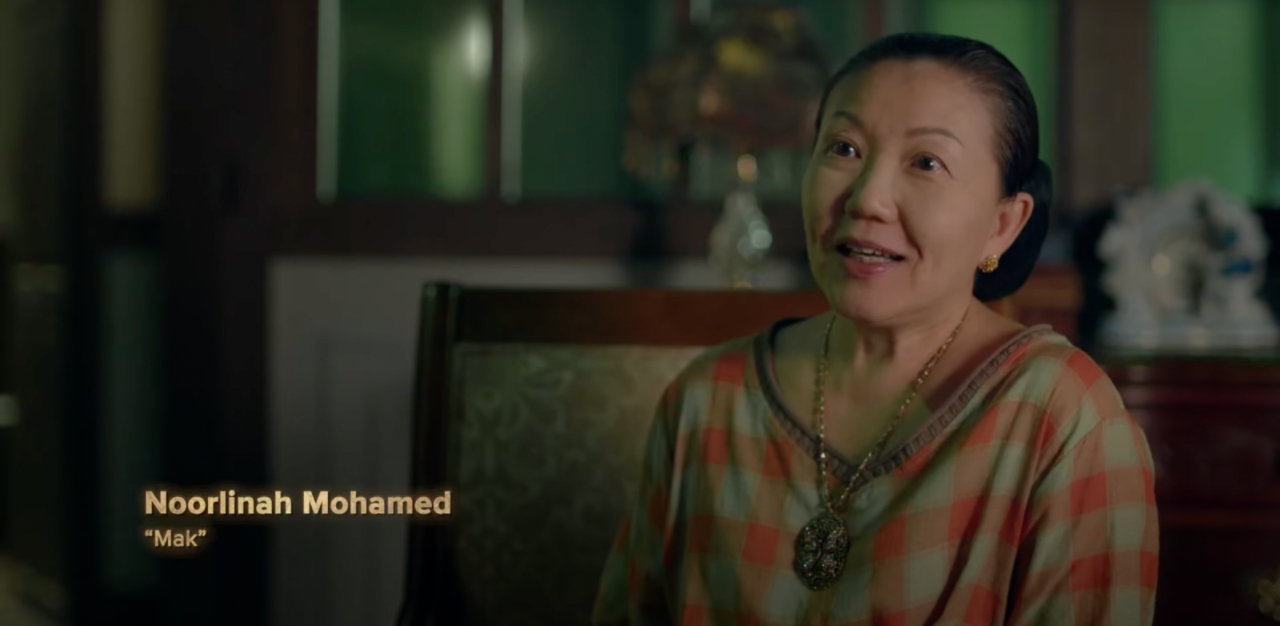
They were filming in the thick of the pandemic and actors were only allowed to take off their masks when they were on camera. Wearing a mask was mandatory at all other times, even during rehearsal or in between scenes. Noorlinah says, “The producer was very serious about adhering to the measures and ensured that everyone is masked up, as non-compliance with the rules might jeopardise the entire production.”
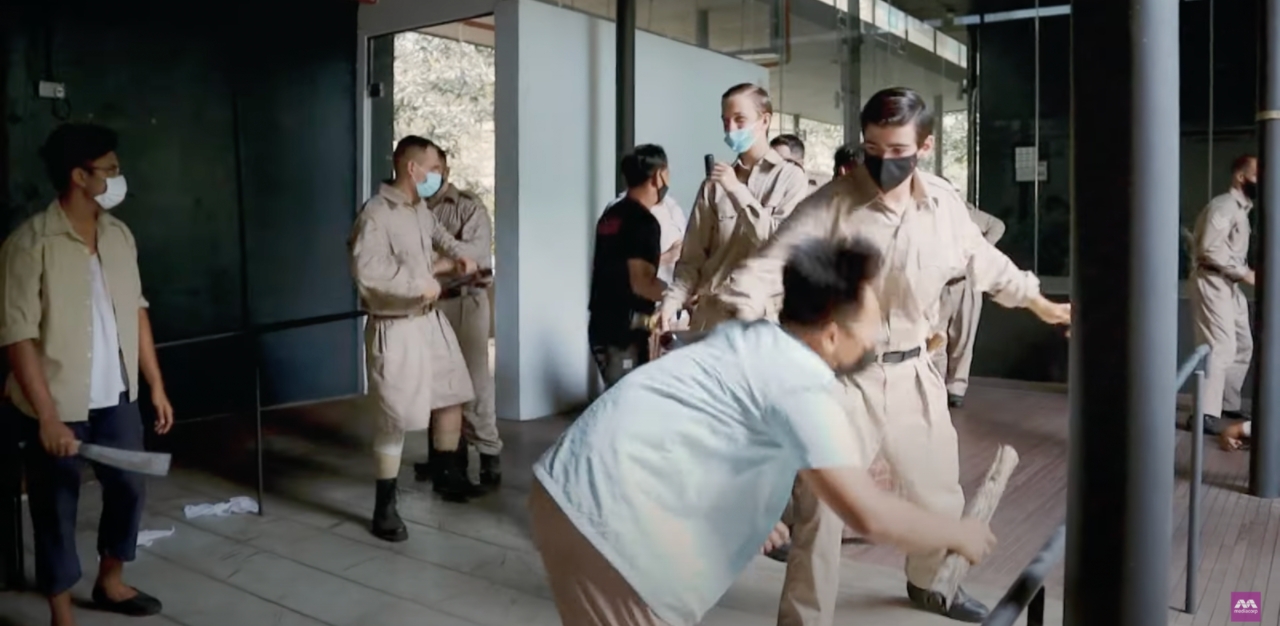
As a result, makeup artists had to touch up the actors’ makeup much more frequently due to masks-induced smudges. In Noorlinah’s case, “opting for a face shield was also out of the question as it messes up the hairdo for my character Mak, who wore a bun”.
However, Noorlinah considers herself fortunate because, as an actor, she was at least able to remove her mask when she was on camera. The crew on the other hand, must be masked up at all times despite the greater physical exertion required of them. These included the lifting of heavy objects or running around the set. Noorlinah adds, “Most of my scenes were filmed indoors where there was air-conditioning, making it less uncomfortable to wear a mask. For actors and crew members who had to film outdoors under the hot sun, it was very challenging indeed”.
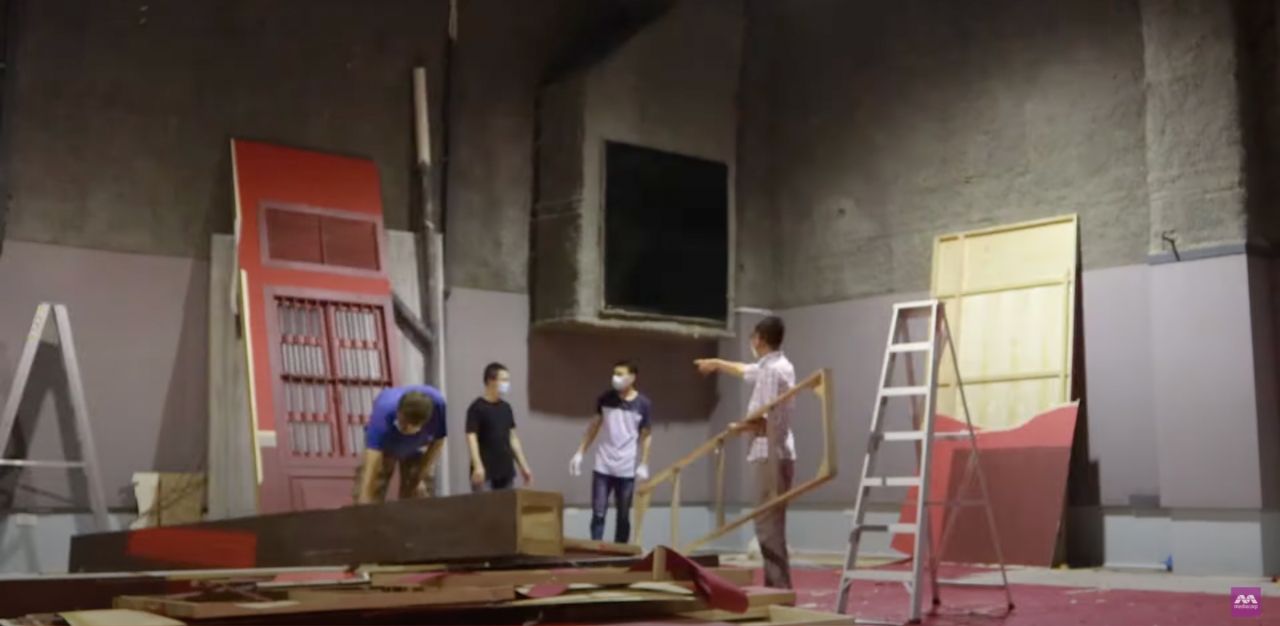
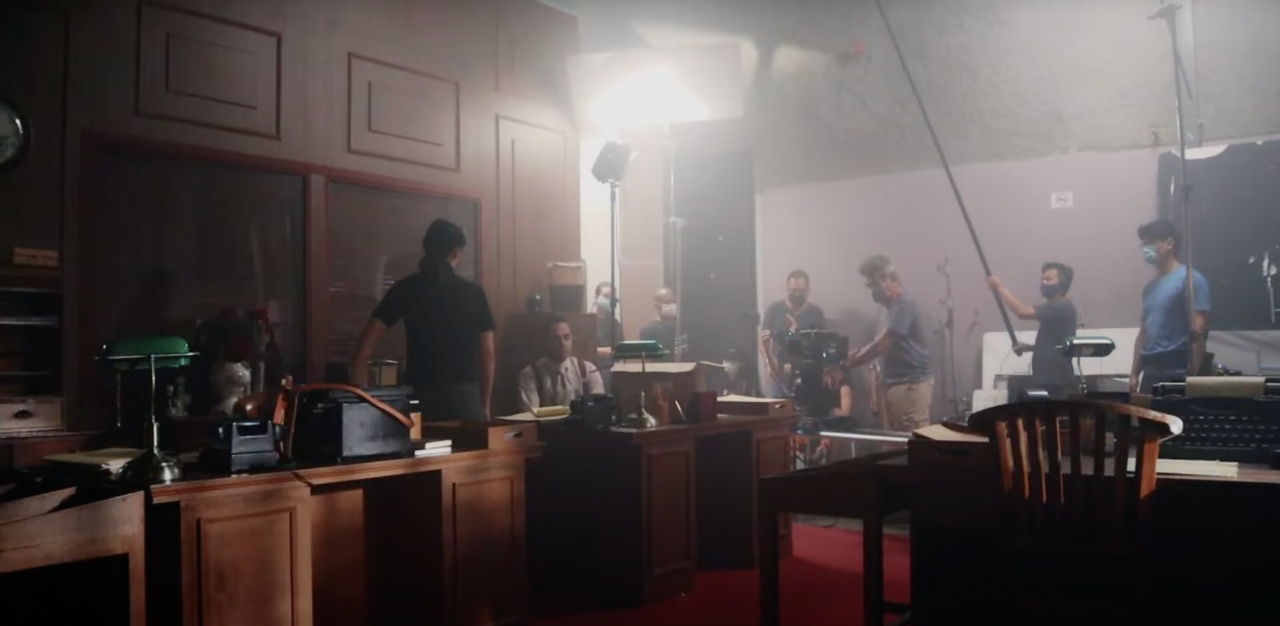
Due to the pandemic, the production team tried to complete the filming as quickly as possible, since there was no telling when the situation could go south, putting a stop to the filming altogether. As a result, filming took up to 13 hours on some days in a six-day work week, while lunch and dinner breaks were shortened to only 40 minutes. Even then, the usual safe distancing rules applied: having meals at designated areas only, no more than five people in a group, one metre safe distancing, and everyone on location were discouraged from lingering longer than necessary.
This took a toll on the actors and crew members as the days rolled on. It was also not easy to look fresh and camera-ready when one worked such long hours, day after day. Noorlinah mentions her ”deep respect for Pierre and Rebecca as they endured a longer period of filming due to their lead roles and had been doing this day in and day out for so long”.
Fortunately, Noorlinah says, her fellow actors as well as the camera and sound crew were very professional and kind-hearted. They cheered one another on in little ways such as buying food for each other and maintaining a positive energy on set.
“Honestly, there were times where the restrictions were quite unbearable, especially for the crew. It was therefore very heartwarming to see actors putting in all efforts to avoid wasting time so as to reduce the crew’s suffering. This is professionalism at its best and they made it so much easier to get through the day,” she adds.
For Noorlinah, COVID-19 has brought about a silver lining of creating a sense of mindfulness among the production team. “Everyone learnt to empathise, care and spare a thought for fellow co-workers and made the workplace a much more enjoyable environment.”
Besides the production for This Land is Mine, Noorlinah, who is also a theatre artist, shares about the challenges there.
She says due to the live nature of theatre, there is a three-metre safe distancing rule between performers and the audience. This is in addition to the usual one-metre safe distance between members of the audience. Pre-event testing is also required when the number of audiences exceeds 50. This greatly increased the cost of production and rendered it unfeasible for many performances to go ahead.
As a result, some productions were cancelled while others such as the Festival of Women had to go digital. Noorlinah highlights the spill-over effects of such disruptions in terms of human costs, especially to gig workers — shrinking employability, financial stress, and the resulting impact on mental health.
Noorlinah reveals that last November, she and four other members in her household tested positive for COVID-19. Fortunately, all of them managed to recover without much discomfort. As a COVID-19 survivor and a witness to the impact of all the restrictions brought about by the pandemic, Noorlinah feels it is about time for Singapore to learn to live with the virus.
“It is better to live responsibly and to care for each other than to live in fear. Yes, some will perish while others live. But those who survive have to learn how to care,” she says.
Join the conversations on TheHomeGround Asia’s Facebook and Instagram, and get the latest updates via Telegram.














